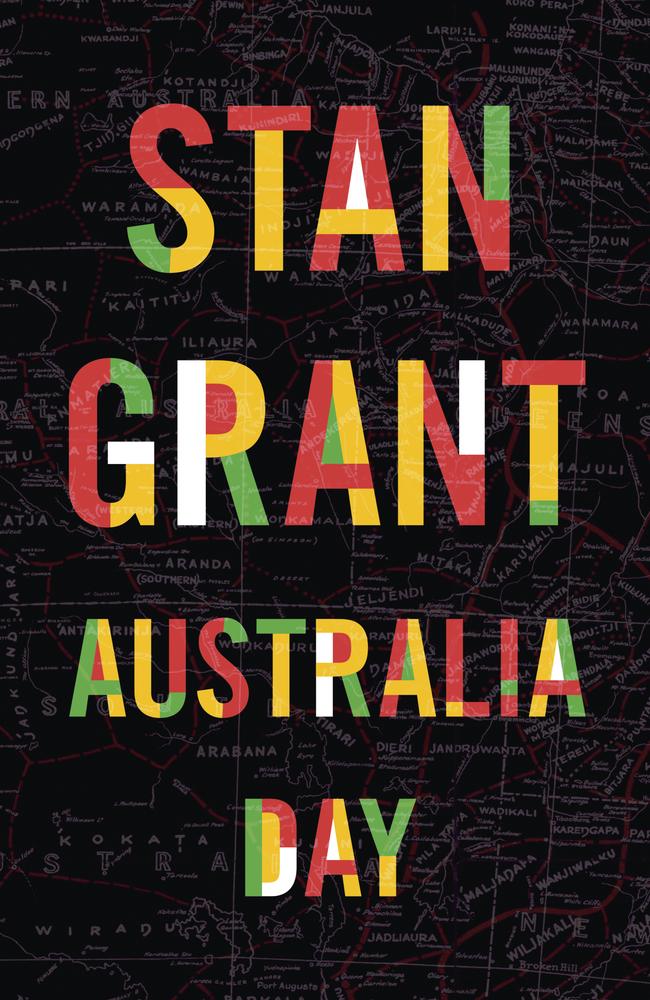Stan Grant’s book Australia Day explores identity politics
Australian author and political journalist Stan Grant looks at the difficult questions we must ask ourselves as Australia Day arrives. In this book extract, he describes it as “a fight with myself”.
Entertainment
Don't miss out on the headlines from Entertainment. Followed categories will be added to My News.
- Jesinta Franklin: ‘Why I won’t celebrate Australia Day’
- The Shark: We must pay our heroic firefighters
Must Australia Day pit black and white Aussies against each other in some conflict without end? Stan Grant laments the swampy politics of identity as “history from the losing end”.
This is an edited extract of Stan Grant’s Australia Day, published by HarperCollins Australia.
I am Australian. I have Australian memories: sun-scorched days at the pool; sticky orange ice blocks; backyard cricket; broken bicycle chains; hot chips and vinegar; warm milk at recess; inkwells; wet woollen jumpers; frost-cracked fingers.
I am Australian. I have Australian history: Captain Cook; the First Fleet; convicts; Blaxland, Lawson and Wentworth; Burke and Wills; Merino sheep; the Gold Rush; Gallipoli; the Great Depression; Menzies and Gough.
I am Australian and I have other memories. Australian memories: a dirt road on the outskirts of town; mangy dogs and broken glass; my father’s wounds; my mother’s poems of stolen kids and welfare men; too many funerals.
I am Australian and I have another history. An Australian history: Bennelong, Pemulwuy and Windradyne, who met the British on the frontier, fought, forged friendships, made peace; Truganini and the black line in Tasmania; the Appin massacre; martial law in Bathurst; segregated missions; the Day of Mourning; no blacks allowed and the Freedom Ride.
This is me. All of it. We are all of this. It just is.

But then, it isn’t. Now it feels like a battleground. It is as if this day — Australia Day — must pit my ancestors white and black in some conflict without end. It is a fight with myself; I can’t possibly win. What am I supposed to forget? What part of my story am I expected to embrace and what part do I reject?
We prize identity more than citizenship. We look to what divides us; define ourselves in opposition to each other. This is an age of grievance, and grievance is a demoralising basis for identity. It is a contest of wounds; a contest in which there can be no winner. Wounds are trumps. At its worst, these singular identities tear the world apart. This is the world I have seen; a world that straddles dangerous fault lines of race, history, religion, ideology. We never learn, it is like we are hardwired for this; we form our tribes and we go to war.
Today, we call this the politics of identity and it is among the great perils of our time. This is identity that breeds in the swamplands of history; history as betrayal; a narrative of loss and inheritance robbed. It is history told from the losing end. It is feeding the resurgence of global populism, from Donald Trump’s “Make America Great Again” to Vladimir Putin’s lament for the Soviet empire or Xi Jinping’s reminder to the Chinese people of the hundred years of humiliation by foreign powers; and it laps against our shores too.

MORE NEWS
Amazon scams cheating Aussie shoppers
Surprising rise of the over-35 first homebuyer
‘Wake up Aussies’: Foreign-made Australia Day items
Scoring the best savings rates
It has been said that looking at history takes one’s breath away. I admit to the choking feeling of living with the burden of the past. As an Indigenous Australian I have felt torn between embracing and celebrating all that is great in our nation, living with the all too painful reality that it is not so great for everyone; and that my family, like so many other Indigenous families, has paid a terrible price for the greatness of Australia. For too long the worst of our history was denied or silenced. But no longer. As uncomfortable as it is, we are reckoning with our history. On 26 January, no Australian can really look away.
As a nation we must ask hard questions of ourselves and there is something that gnaws at me. Yes, it is important to remember, but do we also have to let go? Is forgetting the price we must pay for peace? The history of the world is conquest and violence, nations are born in blood: revolution and war. No land is ever surrendered, but can those vanquished ever win justice? Is reconciliation the best that we can hope for? We write anthems to nations, yet we are still to find a song we can all sing. We must ask ourselves difficult questions on Australia Day. What does it mean to call ourselves a nation? As the nineteenth-century French historian Ernest Renan wrote, a nation is a “daily referendum”; he meant that a nation is never finished, that whatever our differences there is a collective will to live together. There are those who want the date changed from 26 January, others who wish to keep it and some who want Australia Day abolished entirely.
Shouldn’t we first ask: who are we? The debate around our national day tests our democracy: a moral and political claim by a minority that challenges the very legitimacy and morality of the majority. Can we celebrate a day that marks the extraordinary achievements of our nation, when others see it as an insult? Whether the day is moved or not, still we must live together.
Originally published as Stan Grant’s book Australia Day explores identity politics


